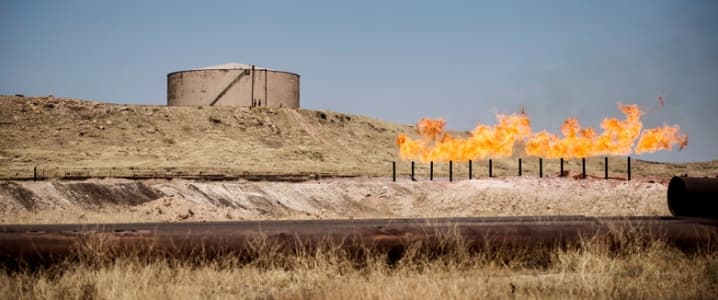Oil prices spiked on Monday after Iraqi forces seized the oil fields around Kirkuk, which had largely been under Kurdish control since 2014. There were conflicting reports as of Monday, but oil supplies from the region may have been disrupted, although perhaps only temporarily.
The military maneuver by Iraqi forces comes as retaliation for the Kurdish independence vote staged a few weeks ago, a move condemned by Baghdad, as well as the governments of Turkey and Iran, both of which have their own Kurdish populations. Iran closed border crossings, and in recent weeks Turkey threatened to cut off Kurdish oil exports.
The debate over Kurdish autonomy within Iraq is decades old, but the vote for independence was a spark that has the country on the brink of civil war. There were reports of a massive wave of civilians fleeing Kirkuk after the military incursion.
Reuters reported that about 350,000 bpd of oil production from the Bai Hassan and Avana oil fields were temporarily shut down. That caused Brent oil futures to jump. “The escalation in Northern Iraq is the main driver,” Commerzbank analyst Carsten Fritsch told the Reuters Global Oil Forum. “Oil supply from this region is at risk.”
However, the Iraqi government insisted that it has restarted production under its control. The Kurdish Regional Government (KRG), according to Reuters, said that it would not stop the flow of oil through its territory, where it is exported to Turkey, and ultimately, to the global market via a Mediterranean port on the Turkish Coast. Related: Mass EV Adoption Could Lead To $10 Oil
Oil traders, after an initial shock, seemed to take the news in stride. “For sure, there are a lot of rumors going on about Iraq today. But apart from the flat price going up...no disruptions have been reported,” a trading source told S&P Global Platts.
Even if oil flows from Iraq through its northern border are online and remain uninterrupted in the near-term, that does not mean that the oil market can breathe a sigh of relief. The struggle for Kirkuk, even if Kurdish forces have largely abandoned their positions for now, means there is an increase in the “potential for political and military miscalculations,” Glen Ransom, Iraq analyst at Control Risks in Dubai, said in a Bloomberg interview.
Moreover, Kurdistan was exporting oil through its own pipeline, completed just a few years ago. In 2014, when ISIS rapidly seized large swathes of territory in Iraq’s north, Kurdish forces moved in and took Kirkuk as Iraqi forces fled ISIS’ advance. Since then, Kurdistan has exported Kirkuk’s oil through its pipeline.
But, with ISIS retreating, the Iraqi government apparently thinks it’s time for Kurdistan to return the oil fields. With their common enemy on the backfoot, the struggle between the KRG and Baghdad has moved to the forefront. “The war on ISIS is edging to an end and now the real war starts, the war between the regional powers in order to control resources and define their own areas of influence,” Sami Nader, head of the Levant Institute for Strategic Affairs in Beirut, told Bloomberg. Related: IEA: Oil Prices To Hit A Ceiling In 2018
However, things aren’t as simple as merely passing control of Kirkuk’s oil fields from the KRG to the Iraqi government. Baghdad may prefer to use its own pipeline through Turkey, but that conduit is in disrepair. Eurasia Group estimates that oil exports could fall by 450,000 bpd until either that pipeline is repaired or Baghdad comes to some sort of revenue sharing agreement with the KRG to export oil through the Kurdish pipeline system.
Leaving aside what one thinks about Kurdish independence, in the short-term, the referendum appears to have dramatically backfired. The KRG sparked the wrath of Baghdad, raised the ire of its neighbors in Turkey and Iran, and even angered its ally in Washington. The U.S. has long been friendly with the Kurds, but Washington will put Iraqi stability over Kurdish independence any day of the week.
That leaves the KRG without a ton of leverage now that the Iraqi military has seized parts of Kirkuk. It may have to acquiesce and allow oil to be exported through its territory under the auspices of the Iraqi government.
ADVERTISEMENT
Ultimately, that probably means that Iraqi/Kurdish oil exports won’t be interrupted for a long period of time, if at all. But the threat to Iraq’s oil supply is higher than at any point in recent years due to the internal strife.
By Nick Cunningham of Oilprice.com
More Top Reads From Oilprice.com:
- Chinese EV Boom Could Crash Oil Prices
- Trump Just Made Iran A Wildcard
- Canada’s Pipeline Industry Takes Another Hit


















